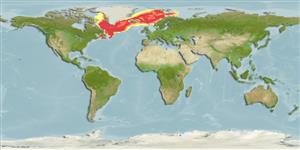| Native range | All suitable habitat | Point map | Year 2100 |

|
| Sebastes mentella AquaMaps Data sources: GBIF OBIS |
Length at first maturity
Lm 43.1 range ? - ? cm
Human uses
Fisheries: commercial
Phylogenetic diversity index
(Ref. 82805)
PD50 = 0.5000 many relatives (e.g. carps) 0.5 - 2.0 few relatives (e.g. lungfishes)
Trophic Level
(Ref. 69278)
4.1 ±0.66 se; Based on food items.
Resilience
(Ref. 69278)
Very Low, minimum population doubling time more than 14 years (K=0.05-0.10; tm=10-13)